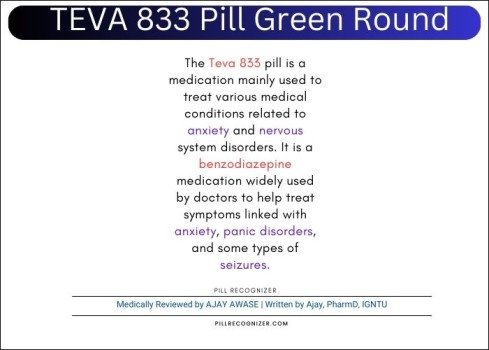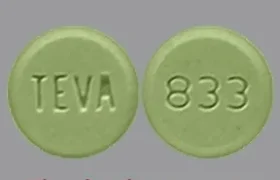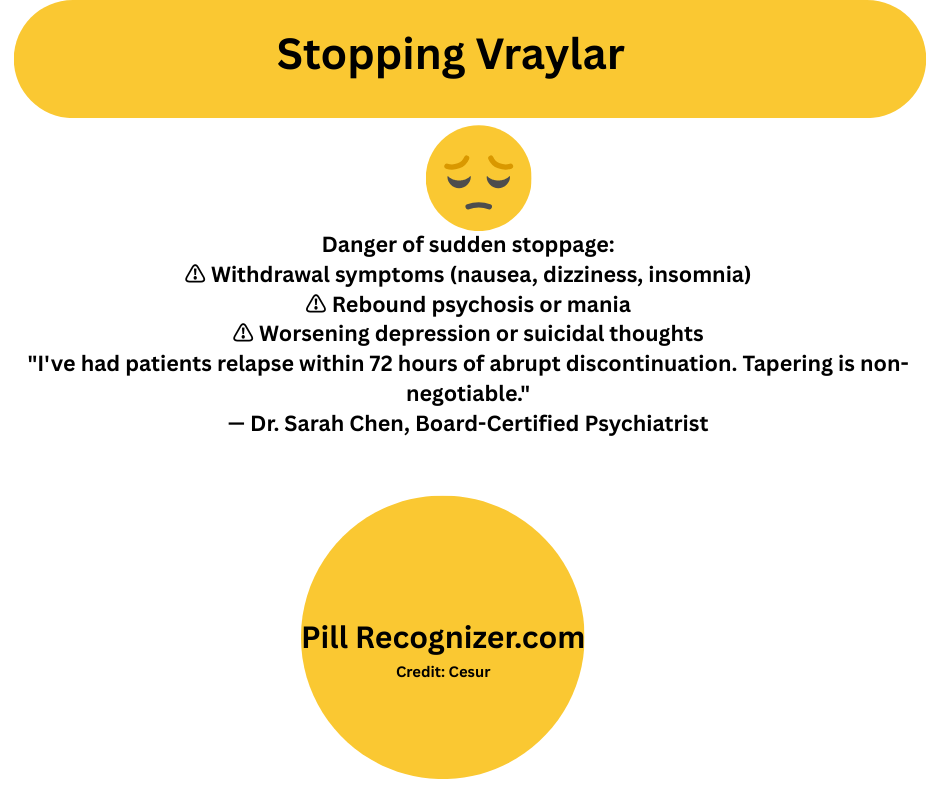Drug Information
Medically Reviewed by AJAY AWASE | Written by Ajay, PharmD, IGNTU
The green, round pill bearing the imprint TEVA 833 is known to contain 1 mg of clonazepam. Teva Pharmaceuticals USA provides it.
Uses: Clonazepam is a member of the benzodiazepine anticonvulsant and benzodiazepine medication classes. It is used to treat Meniere’s disease, Epilepsy, Lennox-Gastaut syndrome, panic disorder, and seizure prevention. Positive evidence exists about human fetal risk during pregnancy. The Controlled Substance Act (CSA) lists clonazepam 1 mg as a Schedule 4 controlled substance.
| Feature | Value |
|---|---|
| Availability | Prescription Only |
| Drug Class | Benzodiazepine anticonvulsants, Benzodiazepines |
| Pregnancy Category | D (Positive evidence of risk) |
| CSA Schedule | 4 (Some potential for abuse) |
| Labeler / Supplier | Teva Pharmaceuticals USA |
| National Drug Code (NDC) | 00093-0833 (Discontinued) |
Table of Contents
- Drug Information
- Uses for TEVA 833
- What is clonazepam used for?
- Clonazepam side effects include:
- Warnings & Precautions
- Interactions
- Overdose/Missed Dose
Uses for TEVA 833

What is clonazepam used for?
The following conditions are often treated with clonazepam.
- Certain forms of epilepsy, often known as seizure disorders
- Panic disorder, commonly known as agoraphobia, with or without a fear of public places
Other conditions may also be treated with clonazepam, as determined by your healthcare professional.
What is the mechanism of action of clonazepam?
The soothing effects of clonazepam on the brain and nerves aid in lowering anxiety, averting seizures, and encouraging relaxation.
In what dose forms is clonazepam supplied?
The following oral dosage forms of clonazepam are available: generic clonazepam, Klonopin, and Klonopin ODT.
- Oral disintegrating tablets containing 0.125 mg
- Oral disintegrating tablets containing 0.25 mg
- Oral dissolving tablets 0.5 mg
- Oral dissolving tablets 1 mg
- 2 mg pills that dissolve in the mouth
- Oral tablets containing 0.5 mg
- Oral tablets containing 1 mg
- two milligram oral tablets
How do I keep clonazepam in storage?
Keep clonazepam at room temperature, 68–77 degrees Fahrenheit (20–25 degrees Celsius). It can be left out in the elements for brief periods of time, like during transit, between 59 and 86 degrees Fahrenheit (15 and 30 degrees Celsius). Keep in a firmly covered container and store in a cold, dry place.
Clonazepam side effects include:
- Drowsiness: Because clonazepam makes you drowsy, you could find it difficult to drive or operate machinery.
- Dizziness: Dizziness is a possibility, especially if you stand up fast.
- Memory problems:Clonazepam may impair your focus and memory.
- Coordination problems: You can experience balance or coordination issues.
- Increased appetite: It is possible for some persons to gain weight and have an increased appetite.
- Fatigue: You can experience weariness or fatigue.
- Constipation or diarrhea: Digestive issues can arise.
- Nausea and vomiting: These are less common side effects.
Less common but more serious side effects include:
- Addiction and dependence: Long-term clonazepam use can result in addiction and physical dependence.
- Withdrawal symptoms: Abruptly stopping clonazepam might result in withdrawal symptoms, which include seizures, anxiety, restlessness, and insomnia.
- Paradoxic reactions: Clonazepam may occasionally result in counterintuitive side effects including heightened agitation or violence.
- Allergic reactions: Allergic reactions to clonazepam are rare but can occur.
Warnings & Precautions
To whom not to prescribe clonazepam?
- Allergies to substances. Clonazepam should not be used by anyone who is allergic to any of the following substances.
- clonazepam
- Klonopin
- Any additional medication that falls under the class of benzodiazepines, like lorazepam or alprazolam
- any of the components that were dispensed in the particular product.
You can find out the whole list of ingredients in the particular clonazepam medications that your pharmacy carries.
Warnings & Precautions of Clonazepam
Clonazepam, like other benzodiazepines, carries certain risks and precautions:
- Dependence and addiction: Both physical and psychological dependence may result from continued use. Severe cessation may result in withdrawal symptoms.
- Cognitive impairment: Clonazepam may cause cognitive impairment, which could impact judgment, memory, and focus.
- Paradoxical reactions: Clonazepam occasionally has the opposite effects, including agitation or violence.
- Respiratory depression:Excessive dosages have the potential to inhibit respiration, particularly in people with respiratory issues.
- Pregnancy and breastfeeding: Clonazepam can damage developing foetuses and enter breast milk. Before using during pregnancy or while nursing, speak with a doctor.
- Substance abuse: The effects of alcohol and opioids, two major depressants, can be amplified by clonazepam.
- Suicide risk: According to certain research, there may be a link between using benzodiazepines and a higher risk of suicide. If you are contemplating suicide, get help right once.
- Elderly patients: The effects of clonazepam may be more noticeable in elderly people.
It’s essential to discuss these risks with your healthcare provider and follow their guidelines for safe and effective use of clonazepam.
Interactions
Are there any food or drink interactions with clonazepam?
Foods or nonalcoholic beverages and clonazepam are not known to interact.
Avoid alcoholic beverages when using clonazepam. Alcohol use may raise the chance of severe side effects, including extreme drowsiness, breathing difficulties, and dizziness.
Does clonazepam have any interactions (drug interactions) with other medications?
It is important to inform your healthcare practitioner about all the vitamins, minerals, herbal items, prescription drugs, over-the-counter (OTC) medications, and other supplements you use.
- Specifically, before taking clonazepam, be sure to mention if you are utilizing any of the following.
- Any other medication that induces drowsiness and dizziness, including as prescription anxieties, sleep aids, anxiety medications, and antipsychotic drugs
- The medication phenytoin (Dilantin, Phenytek, and similar brands) is used to manage seizures.
- A medication called fluconazole (Diflucan) is used to treat fungus infections.
- even though it’s not prescribed for depression, a tricyclic antidepressant
- A monoamine oxidase inhibitor (MAOI) is a medication typically used for Parkinson’s disease or depression.
- Additional medications to manage seizures
Overdose/Missed Dose
If I unintentionally take too much clonazepam, what should I do?
In the event that you or someone else has taken too much clonazepam, call 911, seek emergency medical attention, or get in touch with a Poison Control center at 800-222-1222.
What happens if I forget to take my clonazepam dose?
Take the missed dose as soon as you remember it if you miss it. Take only the next dose, skipping the missed one if it is almost time for your next one. Never take more than one dose or two.

